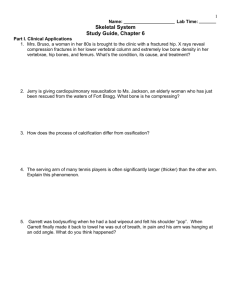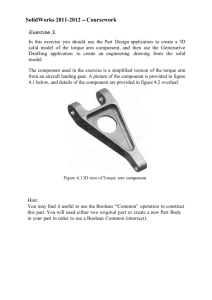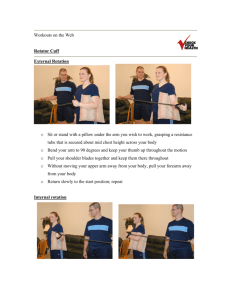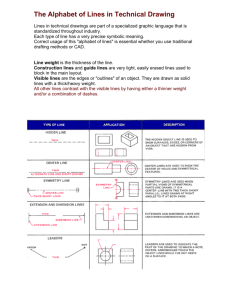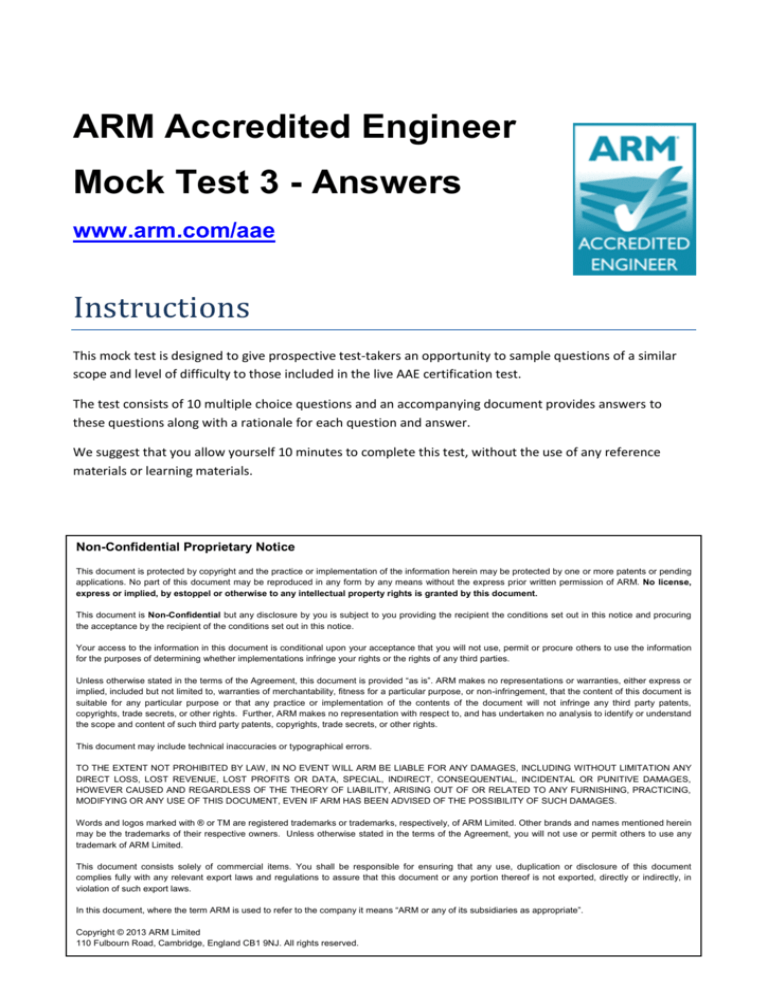
ARM Accredited Engineer
Mock Test 3 - Answers
www.arm.com/aae
Instructions
This mock test is designed to give prospective test-takers an opportunity to sample questions of a similar
scope and level of difficulty to those included in the live AAE certification test.
The test consists of 10 multiple choice questions and an accompanying document provides answers to
these questions along with a rationale for each question and answer.
We suggest that you allow yourself 10 minutes to complete this test, without the use of any reference
materials or learning materials.
Non-Confidential Proprietary Notice
This document is protected by copyright and the practice or implementation of the information herein may be protected by one or more patents or pending
applications. No part of this document may be reproduced in any form by any means without the express prior written permission of ARM. No license,
express or implied, by estoppel or otherwise to any intellectual property rights is granted by this document.
This document is Non-Confidential but any disclosure by you is subject to you providing the recipient the conditions set out in this notice and procuring
the acceptance by the recipient of the conditions set out in this notice.
Your access to the information in this document is conditional upon your acceptance that you will not use, permit or procure others to use the information
for the purposes of determining whether implementations infringe your rights or the rights of any third parties.
Unless otherwise stated in the terms of the Agreement, this document is provided “as is”. ARM makes no representations or warranties, either express or
implied, included but not limited to, warranties of merchantability, fitness for a particular purpose, or non-infringement, that the content of this document is
suitable for any particular purpose or that any practice or implementation of the contents of the document will not infringe any third party patents,
copyrights, trade secrets, or other rights. Further, ARM makes no representation with respect to, and has undertaken no analysis to identify or understand
the scope and content of such third party patents, copyrights, trade secrets, or other rights.
This document may include technical inaccuracies or typographical errors.
TO THE EXTENT NOT PROHIBITED BY LAW, IN NO EVENT WILL ARM BE LIABLE FOR ANY DAMAGES, INCLUDING WITHOUT LIMITATION ANY
DIRECT LOSS, LOST REVENUE, LOST PROFITS OR DATA, SPECIAL, INDIRECT, CONSEQUENTIAL, INCIDENTAL OR PUNITIVE DAMAGES,
HOWEVER CAUSED AND REGARDLESS OF THE THEORY OF LIABILITY, ARISING OUT OF OR RELATED TO ANY FURNISHING, PRACTICING,
MODIFYING OR ANY USE OF THIS DOCUMENT, EVEN IF ARM HAS BEEN ADVISED OF THE POSSIBILITY OF SUCH DAMAGES.
Words and logos marked with ® or TM are registered trademarks or trademarks, respectively, of ARM Limited. Other brands and names mentioned herein
may be the trademarks of their respective owners. Unless otherwise stated in the terms of the Agreement, you will not use or permit others to use any
trademark of ARM Limited.
This document consists solely of commercial items. You shall be responsible for ensuring that any use, duplication or disclosure of this document
complies fully with any relevant export laws and regulations to assure that this document or any portion thereof is not exported, directly or indirectly, in
violation of such export laws.
In this document, where the term ARM is used to refer to the company it means “ARM or any of its subsidiaries as appropriate”.
Copyright © 2013 ARM Limited
110 Fulbourn Road, Cambridge, England CB1 9NJ. All rights reserved.
ARM Accredited Engineer
Mock Test 3 - Answers
Question 1
Which one of the following ARM processors contains a Snoop Control Unit (SCU), for hardware
cache coherency?
A)
B)
C)
D)
Cortex-A8
Cortex-M3
Cortex-R4
Cortex-A5 MPCore
Answer D is correct. The Snoop Control Unit (SCU) maintains coherency between the individual L1
data caches in the ARM MP processors.
Question 2
Which one of the following statements is TRUE for hardware breakpoints?
A)
B)
C)
D)
Hardware breakpoints utilize the BPKT instruction on ARM processors
Hardware breakpoints are not suitable for debugging exception handlers
Hardware breakpoints can be used to debug code running from read-only memory
Cache maintenance operations may be required when placing a hardware breakpoint
Answer C is correct. ARM DS-5 Using the Debug hardware Configuration Utilities: Hardware
instruction breakpoints do not require the instruction in memory to be changed. This means that
they can be used to debug code in Flash and ROM, and can be used with self-modifying code.
Copyright © 2013 ARM Limited
110 Fulbourn Road, Cambridge, England CB1 9NJ. All rights reserved.
Version 1.0
ARM Accredited Engineer
Mock Test 3 - Answers
Question 3
Address
0x24
0x25
0x26
0x27
Contents
0x06
0xFC
0x03
0xFF
If r0 has the value 0x24, what is the content of r12 after executing the following instruction?
LDRB r12, [r0], #2
A)
B)
C)
D)
0xFC
0x03
0x06
0xFF
Answer C is correct. The instruction LDRB has a post-indexed address mode for the base register,
which means that a byte (0x06) will be loaded from the address in r0 into r12, and then the
address in r0 will be updated with the offset (#2).
Question 4
What is the significance of “!” in a load/store instruction?
E)
F)
G)
H)
Don’t update base register in post-indexed load/store
Don’t update base register in pre-indexed load/store
Update base register in post-indexed load/store
Update base register in pre-indexed load/store
Answer D is correct. ARM Architecture Reference Manual section A5.2.5 Load and Store Word or
Unsigned Byte:
! – Sets the W bit, causing base register update.
Copyright © 2013 ARM Limited
110 Fulbourn Road, Cambridge, England CB1 9NJ. All rights reserved.
Version 1.0
ARM Accredited Engineer
Mock Test 3 - Answers
Question 5
For ARMv7-A memory management, which attribute control field is used in a page table entry to
control use of a page table with a given Address Space IDentifier (ASID)?
A)
B)
C)
D)
AP (Access Permission)
nG (Not Global)
SH (Shared)
XN (Execute Never)
Answer B is correct. ARM Architecture Reference Manual for v7-AR section B3.9.1 Global and
process-specific translation table entries:
nG == 0 The translation is global, meaning the region is available for all processes.
nG == 1 The translation is non-global, or process-specific, meaning it relates to the
current ASID, as defined by the CONTEXTIDR.
Question 6
Which TWO of these statements are true for a function that has been built to use hardfp? (Please
select TWO options)
A)
B)
C)
D)
E)
The function must not read from or write to the stack
The result of the function can be returned in a VFP register
Floating point function arguments can be passed in core registers
Floating point calculations are performed using the NEON unit only
Up to 16 function arguments can be passed in floating point registers
Answers B and E are correct. AAPCS (Procedure Call Standard for ARM Architecture) section
5.1.2.1 VFP register usage conventions: registers s0-s15 (d0-d7, q0-q3) do not need to be
preserved (and can be used for passing arguments or returning results in standard procedure-call
variants).
Copyright © 2013 ARM Limited
110 Fulbourn Road, Cambridge, England CB1 9NJ. All rights reserved.
Version 1.0
ARM Accredited Engineer
Mock Test 3 - Answers
Question 7
When a linker creates a static image:
A)
B)
C)
D)
it records the entry point in the ELF header.
it places the entry point at the lowest address.
the entry point must be given on the command-line.
the entry point cannot be given on the command-line.
Answer A is correct. ARM Linker Reference Manual: The image can contain multiple entry points,
but the initial entry point specified with this option is stored in the executable file header for use
by the loader.
Question 8
Which of the following provides fastest access for the processor?
A)
B)
C)
D)
Tightly Coupled Memory (TCM)
Hard disk
Onboard flash memory
Register File
Answer D is correct. Register access is always faster than any memory access.
Question 9
What are software-generated interrupts in a Generic Interrupt Controller (GIC) generally used for?
A)
B)
C)
D)
Causing a delay
Entering a low power state
Communicating between processors
Calling an operating system function
Answer C is correct. Cortex-A Series Programmer’s Guide section 23.3 Handling interrupts in an
SMP system: SGI (Software-generated Interrupt) register can assert private software generated
interrupt on any core, or a group of cores. These Inter-processor Interrupts can be used for kernel
synchronization operations, or for communicating between AMP processors.
Copyright © 2013 ARM Limited
110 Fulbourn Road, Cambridge, England CB1 9NJ. All rights reserved.
Version 1.0
ARM Accredited Engineer
Mock Test 3 - Answers
Question 10
Which of the following methods could be used to calculate the Cycles Per Instruction (CPI) value
for a portion of code?
A)
B)
C)
D)
Single-step the code using a JTAG debugger
Count the cache hits
Use the PMU event counters
Time it with a stopwatch
Answer C is correct. Cortex-A Series Programmer’s Guide section 16.1.4 ARM performance
monitor: The performance monitor hardware is able to count several events, using multiple
counters. Normally, we combine together multiple values to generate useful parameters to
optimize. For example, we can choose to count the total number of clock cycles and the number of
instructions executed and use this to derive a cycles per instruction figure which is a useful proxy
for the efficiency with which the processor is operating.
Copyright © 2013 ARM Limited
110 Fulbourn Road, Cambridge, England CB1 9NJ. All rights reserved.
Version 1.0

